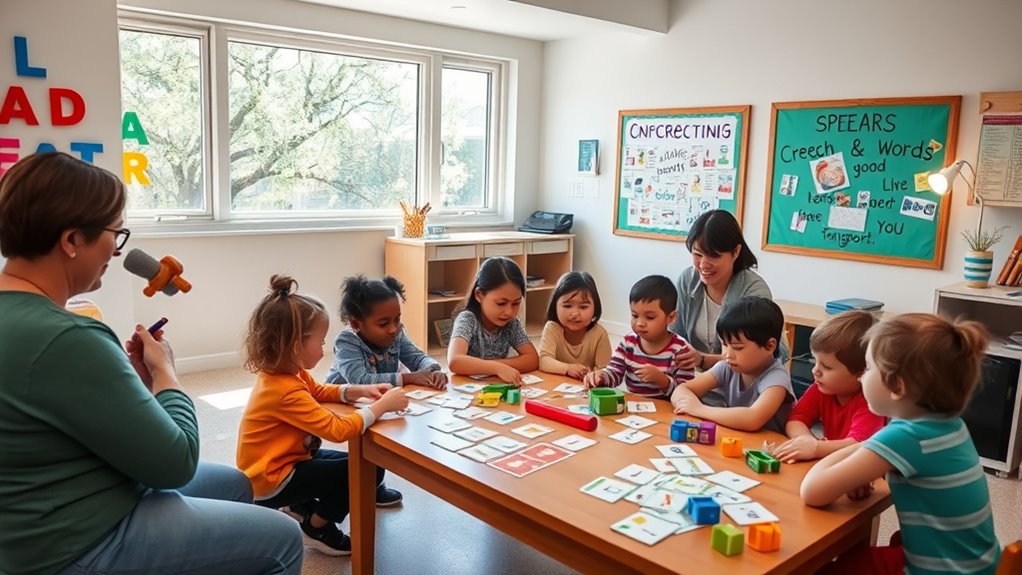If your child struggles with speech or language issues, speech therapy services can be an essential resource. These services help kids articulate thoughts, develop social skills, and overcome communication disorders. Early intervention boosts treatment success and prevents future academic and social challenges. Each therapy plan is tailored to your child’s needs, often involving fun activities and family support. You’re just scratching the surface; there’s more to discover about the types of disorders treated and benefits of therapy.
Key Takeaways
- Local speech therapy services provide tailored support for children with speech, language, and communication disorders.
- Early intervention is crucial for improving treatment outcomes and preventing academic and social difficulties.
- Therapy methods often include play-based activities and structured sessions, enhancing engagement and learning.
- Parents play a vital role in therapy, supporting their child’s progress with consistent home practice.
- Access to services may vary by demographics, highlighting the importance of community awareness and resource availability.
Understanding Communication Disorders in Children

When you consider how communication disorders affect children, it’s clear that these challenges can considerably impact their lives. Approximately 8% of kids face issues related to speech, language, or hearing.
These disorders can take various forms, including speech sound disorders, language disorders, and social communication disorders. For instance, a child with a speech sound disorder may struggle to articulate words clearly, while another might’ve difficulty understanding or using language effectively.
Such problems can lead to academic struggles and hinder social interactions, making it tough for children to connect with their peers. Recognizing the symptoms early on, like language delays or unclear speech, is essential for ensuring they receive the support they need to thrive.
Importance of Early Intervention

Early intervention is essential for children facing communication challenges, as it greatly enhances their chances of overcoming speech and language disorders. By addressing speech impediments early on, you can improve treatment outcomes and help your child develop vital communication skills like listening and social interaction.
Early intervention also prevents secondary issues, such as poor academic performance and social isolation, while providing cost-effective support that reduces the need for extended therapy. Identifying speech delays before they become severe allows for tailored treatment plans that greatly benefit your child.
With your active involvement and the right tools, you can support their communication development, laying a strong foundation for future success in both social and academic environments.
Overview of Speech Therapy Services

Understanding the importance of early intervention sets the stage for exploring speech therapy services designed to help children overcome communication challenges.
Speech therapy addresses various disorders, including speech delays, stuttering, and articulation issues, with the goal of improving communication skills. You’ll find that speech-language pathologists tailor therapy plans to each child’s needs, using play-based activities and structured practice sessions.
These methods enhance vocabulary, clarity, and social interactions. Involving parents in the process is essential, ensuring consistent support at home. Regular progress assessments help refine therapy plans, and the services are available in schools, private clinics, and hospitals.
Ultimately, speech therapy fosters better communication, leading to increased confidence and improved social and academic performance for your child.
Demographics and Access to Services

Nearly 8% of children in the U.S. between ages 3-17 face communication disorders, highlighting the urgent need for effective access to speech therapy services.
Nearly 8% of U.S. children aged 3-17 experience communication disorders, emphasizing the critical need for accessible speech therapy services.
Boys, at 9.6%, are more affected than girls, who’ve a 5.7% prevalence. Non-Hispanic Black children also experience higher rates at 9.6%, compared to 7.8% for White and 6.9% for Hispanic children.
The highest prevalence occurs in children aged 3-6, at 11%. While 55.2% of children with communication disorders receive intervention services, access varies by race and gender.
Non-Hispanic White children receive services more frequently than their Black and Hispanic peers. Addressing these disparities is essential to guarantee all children get the support they need for their communication challenges.
Benefits of Speech Therapy

Access to speech therapy services is essential for children facing communication disorders, but the benefits of these services extend far beyond just addressing speech issues.
You’ll notice your child enhancing their ability to articulate thoughts effectively and improving their understanding of body language. Speech therapy develops vital conversation skills, such as active listening and appropriate responses, fostering better communication and reducing misunderstandings.
It boosts confidence in social interactions and helps form stronger relationships by teaching effective questioning and non-verbal cues. On a cognitive level, your child will enhance language comprehension, listening abilities, and vocabulary.
Ultimately, speech therapy supports your child’s independence, self-esteem, and engagement in social activities, paving the way for long-term personal and social development.
Types of Communication Disorders Treated

Communication disorders can take many forms, impacting a child’s ability to express themselves or comprehend language effectively.
Communication disorders affect a child’s ability to express and understand language, impacting their social and educational experiences.
You might notice speech sound disorders, where articulation and clarity become challenging. Voice disorders can affect pitch and volume, while fluency disorders, such as stuttering, disrupt speech flow.
Language disorders also play a significant role, including expressive language disorder, which hampers speech production, and receptive language disorder, making it hard to understand spoken words.
Hearing disorders like hearing impairment and central auditory processing disorders can further complicate communication.
Each of these conditions requires tailored interventions, ensuring your child receives the support needed to thrive in both social and educational settings.
Early identification and therapy can dramatically improve their communication skills.
Policy Initiatives for Improved Access

While addressing the needs of children with speech disorders, various policy initiatives play an essential role in improving access to necessary services.
Medicaid often covers speech therapy for eligible children, requiring medical necessity documentation. In schools, laws like IDEA mandate that therapy services are outlined in Individualized Education Programs (IEPs).
Additionally, some states offer publicly funded Early Intervention services for children under three, focusing on developmental needs. Insurance policies vary, frequently demanding pre-authorization.
Community resources like RiteCare Clinics provide free or low-cost therapy, regardless of financial status. Advocacy groups push for better funding and accessibility, emphasizing the importance of early intervention.
Through these initiatives, you can help guarantee children receive the speech therapy services they need.
Frequently Asked Questions
How Can I Find a Speech Therapist for My Child?
To find a speech therapist for your child, start by asking your pediatrician for recommendations.
Check with your insurance company for in-network options. You can also explore online directories or local college clinics for affordable services.
Don’t forget to look into public school programs, which often provide therapy.
Additionally, consider online therapy platforms for convenience.
Researching these resources can help you find the right support for your child’s speech needs.
What Age Should My Child Start Speech Therapy?
When should you start speech therapy for your child? If you notice signs of delayed speech, it’s time to act.
For infants, consider therapy if they’re not babbling by six months. For toddlers, look for missed milestones like first words by 18 months.
The earlier you seek help, the better, as young children adapt quickly. Don’t hesitate to consult a professional; early intervention can make a significant difference in your child’s communication skills.
How Long Does a Typical Speech Therapy Session Last?
A typical speech therapy session lasts between 30 to 60 minutes, depending on your child’s age and attention span.
For younger kids, shorter sessions might be more effective, while older children may benefit from longer ones.
Some programs even use brief 5-minute sessions for focused practice.
The frequency can range from one to three times a week, tailored to your child’s specific needs and goals set by the speech-language pathologist.
Will My Insurance Cover Speech Therapy Services?
To find out if your insurance covers speech therapy services, you’ll need to check your specific plan details.
Generally, coverage depends on whether the therapy is deemed medically necessary. You’ll likely need a referral from your primary care doctor and an evaluation to confirm the need.
What Should I Expect During a Speech Therapy Evaluation?
Imagine stepping into a world where every word counts. During a speech therapy evaluation, you’ll observe your child engaging in playful activities while the therapist assesses their communication skills.
They’ll evaluate articulation, language understanding, and even social interactions. Expect discussions about results and tailored recommendations.
Your involvement is key, so be ready to share insights about your child’s history. This process lays the groundwork for effective therapy and meaningful progress.
Conclusion
To sum up, accessing speech therapy services can be a game-changer for children with communication disorders. By intervening early, you can set the stage for your child’s success in school and social situations. As you consider the options available, think about this: wouldn’t you want the best possible start for your child’s communication journey? With the right support and resources, you can help them thrive and express themselves confidently. Don’t wait—take action today!









